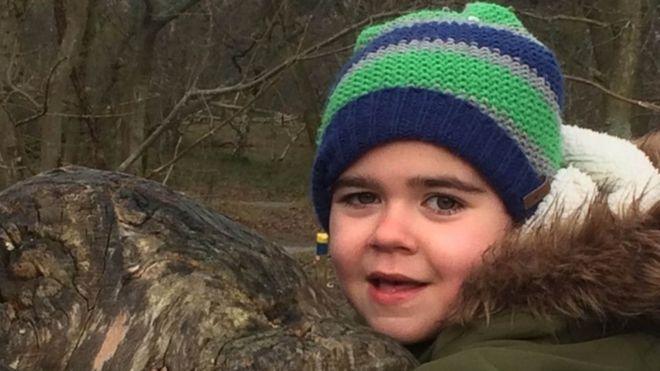Week ahead in Parliament
- Published
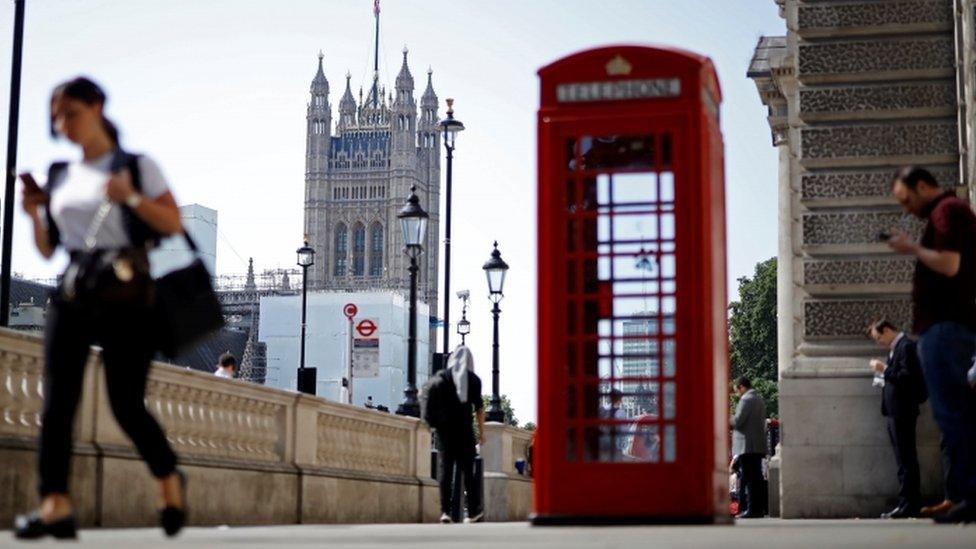
That discordant scraping sound you hear in Westminster? It is the sound of ministers scouring the bottom of the legislative barrel to find more micro-measures for MPs to consider, while they wait for a new prime minister and his government agenda to appear.
So, there is legislation in the Lords on the national insurance contributions treatment of money from sporting testimonials, and the non-domestic rates paid on public lavatories.
In the Commons, there is a little more substance, with a bill to provide tougher sentences for animal cruelty.
But the story of the week is an attempt to use some routine Northern Ireland legislation to change the law there on gay marriage and abortion.
This seems to be gaining momentum, with more and more signatures being added to two key amendments - but it could still run into procedural trouble.
There is plenty of action on the Committee Corridor, not least a series of appearances by cabinet ministers who may be in a new job - or out of a job - when a new prime minister takes office.
And look out for the Gemma White report on the treatment of MPs' staff, which is expected to provide a number of (initially) anonymous horror stories about the experiences of Westminster bag carriers.
I trailed this last week, after strong rumours it was about to appear, and then it didn't surface - but the Commons authorities are bracing themselves once again.
Remember, this is an independent inquiry, and the timing of the report is a matter for the inquiry team, not the parliamentary authorities.
It may or may not generate some kind of statement or urgent question in the chamber - but it will certainly make waves, when it arrives.
Here's my rundown of the week ahead:
Monday 8 July
The Commons week opens at 14:30 BST with defence questions, doubtlessly followed by the usual crop of post-weekend ministerial statements and urgent questions.
The day's main event is the Northern Ireland (Executive Formation) Bill - another of the regular measures to keep government in Northern Ireland ticking over in the continued absence of the devolved executive, which has not functioned since March 2017.
Labour's Conor McGinn, who has already proposed legislation to extend equal marriage to Northern Ireland, has an amendment to change the law within three months if the devolved government remains stalled.
This is a carefully calibrated proposal, which attempts to draw on MPs' increasing frustration with the political deadlock in Northern Ireland, while offering an opportunity for the issue to be dealt with via the devolved institutions, if they resume their operation soon.
The Labour MP Stella Creasey is leading another cross-party group pushing a parallel amendment to ensure abortion access in Northern Ireland - the procedure is currently illegal in all circumstances, with heavy jail sentences for both women and any medical professionals who assist them.
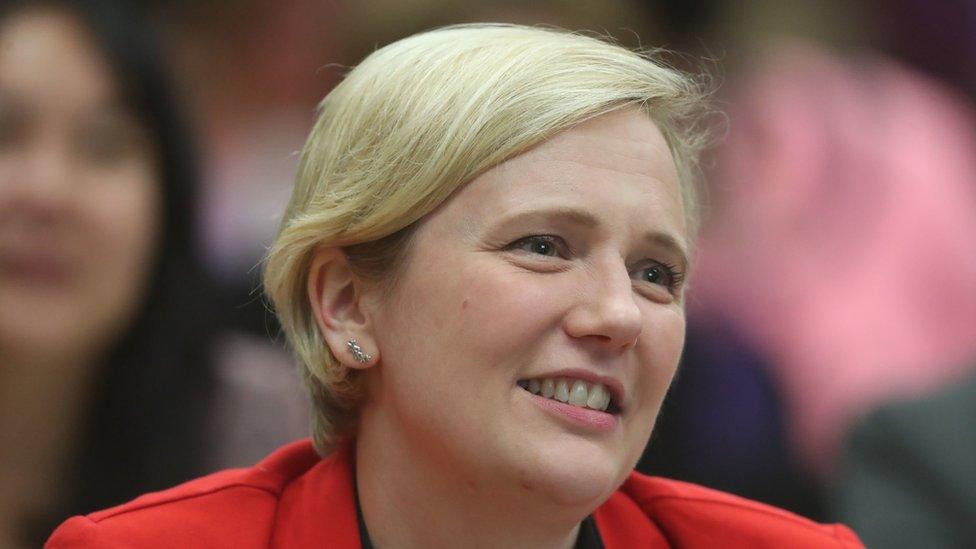
Stella Creasy is tabling an amendment to the Northern Ireland (Executive Formation) Bill
As a result last year, more than 1,000 women had to travel to England or Wales for a termination, with many more unable to do so.
Hard on the heels of the Women and Equalities Select Committee's harrowing inquiry into access to abortion in Northern Ireland, it would give the secretary of state powers to change the law, again, in the absence of devolved government.
And there is also an official Labour amendment to provide pensions for victims of the Troubles.
The stumbling block here is that the government is seeking to get this bill through all its Commons stages in two days. It was originally going to be in one, but under pressure a second day was promised, although the Government have not said which day it will be.
This means the time available for controversial amendments may be a little tight - and both would certainly be resisted by the Democratic Unionists.
Another tricky question is whether the government would allow a free vote on what are normally "conscience issues", or whether it will take the view that the devolution implications trump that.
Much will depend on the Chairman of Ways and Means, the Senior Deputy Speaker Lindsay Hoyle. He is tasked with selecting amendments for committee stage consideration and ruling on whether they come within the scope of the bill - and the scope is extremely narrow, focusing on setting a new deadline for the formation of a new executive on 21 October.
Amendments which say that the required progress report by the minister should discuss these issues might have a better chance of selection, unless the rules are stretched a bit.
The adjournment debate, led by the Conservative Jeremy Lefroy, is on the risk of manipulation of precious metal markets.
In Westminster Hall at 16:30, MPs debate e-petition 236952, which calls for life sentences for the crime of death by dangerous driving - Violet-Grace's Law - and attracted 164,142 signatures.

Violet-Grace Youens was killed in a hit-and-run car crash when she was four-years-old
The petition says: "The men who killed our daughter drove a stolen a car at 83 mph in a 30 mph zone.
"They killed our 4-year-old daughter Violet-Grace and severely injured her nan, who has life-changing injuries.
"They will serve less time in prison than Violet was alive. I don't want other families to suffer like this."
On the Committee Corridor at 15:45, there is one for the Parliamentary nerds - a Committee of Privileges evidence session on select committees and contempts - basically discussing whether Parliament should have some way of punishing people who refuse a summons to appear before a committee.
Giving evidence are the Clerk of the Commons, John Benger, plus MPs Chris Bryant and Sir Bernard Jenkin, who is the chair of the Public Administration and Constitutional Affairs Committee.
The inquiry was suspended for the duration of a separate inquiry into an alleged contempt by Dominic Cummings for failing to attend a select committee hearing - the House subsequently passed a resolution admonishing him.
The proposed closure of Ford's Bridgend plant is the subject of the Welsh Affairs Committee at 16:15, with evidence from Chairman of Ford Europe, Steven Armstrong, GMB Union Councillor, Jeff Beck, the Leader of Bridgend Council, Huw David, and the Minister for Economy and Transport in the Welsh Government, Ken Skates.
In the Lords at 14:30, questions to ministers have a green flavour, with the Green peer Baroness Jones of Moulsecoomb on carbon budgets, the Lib Dem, Baroness Boycott, on soil health, and Labour's Lord Lennie on smart meters.
The independent peer Baroness Tonge also has a question about the treatment of Palestinian children by the Israel Defence Forces.
The main legislating is on the Parliamentary Buildings (Restoration and Renewal) Bill - this is the Committee stage which tends to be exploratory, so it is unlikely anything will be put to a vote.
There will also be a short debate on the recent G20 Summit in Osaka, Japan, and the letter sent to the prime minister by the Lords International Relations Committee, highlighting concerns about a possible new economic crisis, a growing threat to the rules-based international order, and the G20's ability to track compliance of members with agreements reached at its summits.
Tuesday 9 July
Commons business opens at 11:30 with justice questions, which could be a last hurrah for Lord Chancellor David Gauke.
Then the former Environment Minister George Eustice - a Tory MP for Cornwall - has a Ten Minute Rule Bill on Tin Mining Subsidence, giving the Coal Authority the powers to tackle the issue or make compensation payments.
The main debate is on the Second Reading of the Animal Welfare (Sentencing) Bill, which will bring in tougher prison sentences of up to five years for the worst animal abusers - a significant increase on the current maximum of six months.
In Westminster Hall, the opening debate at 09:30 is on government support for active travel, local walking and cycling infrastructure plans, led by the Conservative Robert Courts and Labour's Stephen Morgan.
They will be pushing for a simpler funding system to support efforts from local authorities seeking to meet the aims and targets of the government's cycling and walking investment strategy.
Expect plenty of local examples of how cycling could be boosted in their respective constituencies.
Labour MP Carolyn Harris continues her parliamentary campaign at 11:00 on the safety of electrical goods, with a debate on the regulation of their online sale.
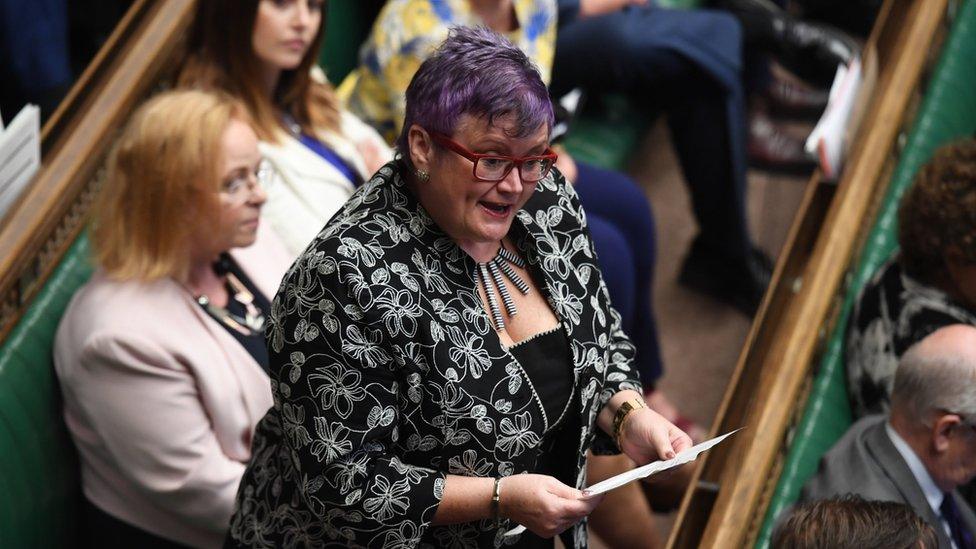
Labour's Carolyn Harris will lead a debate on the safety of electrical goods
She is concerned that the growth of online shopping has increased the sales of sub-standard counterfeit items like hair straighteners and food blenders, which have then caused electrical fires.
The findings of a report by the pressure group Women for Refugee Women will be raised by Labour MP Jess Phillips at 14:30 in a debate on immigration detention of survivors of trafficking and modern slavery.
This highlighted the plight of women from China who have been trafficked into sexual exploitation or forced labour, then detained at Yarl's Wood detention centre for long periods.
This is in contravention of Home Office policies, which state that vulnerable people should not normally be detained and that survivors of trafficking should have access to safe accommodation where they can access independent legal, practical and emotional support.
The report argues that detention has a re-traumatising effect on vulnerable people and that many of the trafficked Chinese women they have been supporting became suicidal in detention.
On the Committee Corridor, Sir David Attenborough appears before the Business, Energy and Industrial Strategy Committee at 10:00 to answer questions on Clean Growth Strategy and International Climate Change Targets.
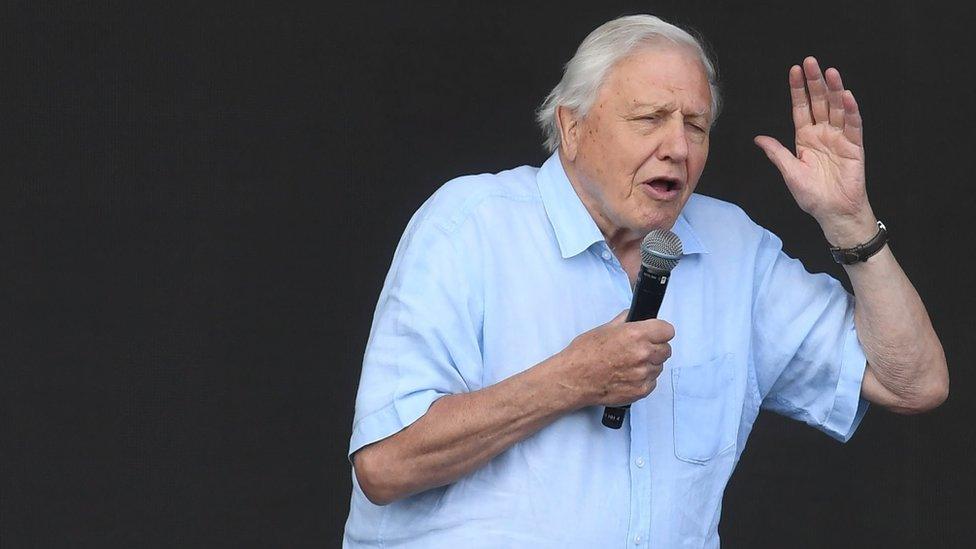
Sir David Attenborough is due to appear in front of a select committee
The Science and Technology Committee at 09:30 conclude their inquiry into commercial and recreational drone use in the UK, and the Health and Social Care Committee quiz Health Secretary Matt Hancock at 12:30.
In the second session of its reality TV inquiry, the DCMS Committee will take evidence at 10:30 from Channel 4 executives about the duty of care to participants in programmes like One Born Every Minute, The Undateables, Big Fat Gypsy Weddings, The Circle, Benefits Street, and Big Brother.
In the Lords at 14:30, questions to ministers include Lord Selkirk of Douglas on the proposed memorial to the Normandy landings in Ver-sur-Mer - where there is some local opposition over fears that rural land will be lost.
Peers then turn to the detail of the Birmingham Commonwealth Games Bill, before the Bishop of Durham leads a debate on a report by the pressure group Project 17, "Not Seen, Not Heard: Children's experiences of the hostile environment", which deals with the position of children living in migrant families with no recourse to public funds.
Wednesday 10 July
The Commons opens at 11:30 with another question time for a minister with an uncertain future - the Chancellor of the Duchy of Lancaster David Lidington.
That will be followed at 12:00 by Prime Minister's Question Time.
The day's Ten Minute Rule Bill, from the Labour former justice minister Maria Eagle, would create a public advocate to act on behalf of bereaved families where there had been a major disaster.
The bill, drawn up in collaboration with another former Justice Minister, Lord Wills, draws on the experience of the Hillsborough Independent Panel.
The panel's findings convinced them both that the current system for dealing with the aftermath of large-scale public disasters like Hillsborough - and more recently Grenfell - fails bereaved families and survivors, leaving them feeling excluded from the processes that are meant to provide answers about how the tragedies occurred, and deliver justice in cases of wrongdoing.
MPs will then be asked to approve statutory instruments on transferring EU Environment Directives into UK law and on planning fees.
The main debate will be on tackling climate change, protecting the environment and securing global development.
In Westminster Hall, the opening debate at 09:30 sees former Foreign Office and International Development Minister Alistair Burt promoting one of the issues he was responsible for in government; the aspiration for worldwide universal health coverage - which is one of the key sustainable development goals.

Alistair Burt will open a debate on worldwide universal healthcare
The argument is that access to healthcare leads to a better educated population, as healthier children spend more time in education, and that leads to greater opportunities in life, particularly for girls.
But pursuing this policy means a switch in emphasis from things like vaccination and immunisation programmes, towards helping developing countries build up their health provision.
Mr Burt's successor, Dr Andrew Murrison, will answer for the government.
Other subjects for debate include a registration scheme for drone users at 11:00; a retail strategy for the future at 14:30; economic growth and environmental limits at 16:00, and the business case for High Speed 2 at 16:30.
This last one is interesting because it is led by former Leader of the House Andrea Leadsom, who has been a critic of the scheme in office, and is now free to move to full-throated opposition.
On the Committee Corridor, the Justice Committee at 10:00 talks to senior judges and the Lord Chancellor David Gauke about the government's court and tribunal reforms.
In the Lords at 15:00, peers deal with a couple of legislative morsels - the detail of the National Insurance Contributions (Termination Awards and Sporting Testimonials) Bill and the Second Reading of the Non-Domestic Rating (Public Lavatories) Bill - before debating sustainable development goals.
Thursday 11 July
MPs begin their day at 09:30 with half an hour of international trade questions, followed by women and equalities questions.
Then comes the weekly Commons Business Statement, and questions to the Leader of the House, Mel Stride.
The main debates, chosen by the Backbench Business Committee, see the SNP's Pete Wishart discussing 20 years of devolution, followed by a motion on leasehold reform from the chair of the Housing Communities and Local Government Committee Clive Betts.
This is a motion urging the government to act on the recommendations of the committee's report on leaseholds, urging legislation to end "onerous terms" on existing leases, a switch to the commonhold model, and calling for the removal of incentives for developers to build leasehold properties for sale.
And the day ends with a debate to mark the centenary of GCHQ - the government's communications monitoring centre - led by local MP Alex Chalk.
In Westminster Hall at 13:30 there is a debate on public libraries.
In the Lords at 11:00, peers debate, "creating an environment which encourages business growth and job creation, especially in relation to the tax system", and "the extent of persecution of people of faith in this century".
- Published5 November 2018
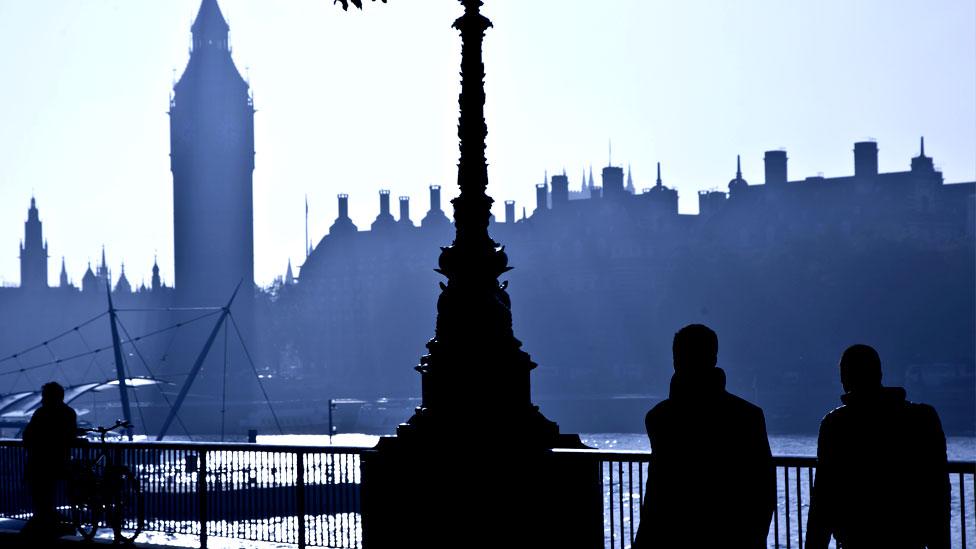
- Published6 April 2019

- Published27 October 2018
